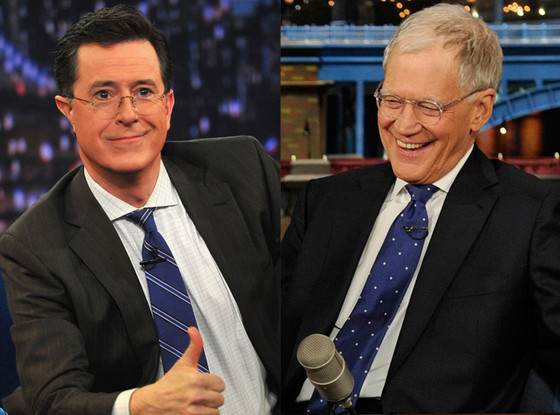|
Because I am slow, I needed my son (and later, in print, Maureen Dowd) to explain to me that the Stephen Colbert I see in fragments is his entire act.
In my tangential relationship to much of television, I assumed this was one facet of Colbert’s persona, that sometimes he was actually Stephen Colbert. But, no, I was patiently told, he does this all the time. So now Colbert is about to replace David Letterman in the next year or so. As somebody who has grown older along with Letterman, I admit to misgivings. Wait, they have given a terrific forum to somebody who mimics right-wing wackos? How will that work in interviewing guests? Will Colbert switch a dial and draw out guests the way Dave does in his own twitchy way? (My inner adolescent loves Dave talking about Martha Stewart and the justice system: “She shot a guy.” And how Dave made poor addled John McCain squirm for ducking him in 2008. And the quacking noises when Dr. Phil arrives. And Dave’s flat-out crushes on Julia Roberts and Cate Blanchett, and why not?) Probably it’s just me, but I don’t find Colbert funny. (I know he’s a good, smart family guy.) I think it’s because, in addition to soccer and baseball, I watch mostly news on television and they are all over the place. Ted Cruz? Louie Gohmert? Darrell Issa? Mitch McConnell? The Koch Brothers? The Fox lot? Rand Paul? Eric Cantor? Frothing preachers? Avaricious bankers? State legislators trying to make it harder to vote? Beyond satire. The first time I saw much of Colbert was via the televised correspondents’ dinner in 2006 when he made fun of President Bush, who was there. My politics are the same as Colbert’s, but I still thought it was tacky. Remember this? https://www.youtube.com/watch?v=U7FTF4Oz4dI I have the feeling Colbert has created a role that may be hard to put behind him – much like another good man, James Gandolfini, who in his later work still seemed about to reach for his pistol. Not his fault. He had done too good a job creating Tony Soprano. We’ll see. Next Tuesday, Colbert will appear on the Letterman show. The tastes of late-night audiences shift by the generation, of course. I tried watching Jimmy Fallon for his first few weeks. Love his band, but Fallon seems on a perpetual sugar rush. I dialed back to Dave, fiddling with papers on his desk, puzzling over electronics. I’m hoping Dave, in his late-maturing way, will draw out the inner Stephen Colbert.
Ed Martin
4/16/2014 05:01:47 am
Not to worry GV. I have read several times that he will not play his Fox (faux) persona as the host. How that will play is CBS' guess. I bet he will do a sketch as himself- you know, I'm just saying, like...
Brian Savin
4/17/2014 02:18:31 pm
Agreed. Colbert is not a nut. Also, his persona is not without progressive elements that are actually completely absent from the current Administration and its anti-democratic special interests focus. Colbert is a worthy Letterman successor and he may help clarify current political confusion, if he has the nerve. Let's hope and see.
bruce
4/18/2014 03:10:47 am
George, 11/23/2015 02:03:51 am
I do believe that Colbert is an ambiguous figure. I agree that he's bright and has a special gift to stand out, but at the same time, there is something that I can't understand. It scares me sometimes.
bruce
11/23/2015 02:10:17 am
george, Comments are closed.
|
Categories
All
|










